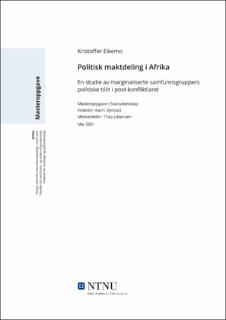| dc.contributor.advisor | Dyrstad, Karin | |
| dc.contributor.advisor | Johansen, Thea | |
| dc.contributor.author | Eikemo, Kristoffer | |
| dc.date.accessioned | 2021-09-28T17:34:01Z | |
| dc.date.available | 2021-09-28T17:34:01Z | |
| dc.date.issued | 2021 | |
| dc.identifier | no.ntnu:inspera:80180200:31573706 | |
| dc.identifier.uri | https://hdl.handle.net/11250/2784557 | |
| dc.description.abstract | Maktdelingslitteraturen har i stor grad vært rettet mot hvilke forhold på landnivå som påvirker statlig utvikling, men vi vet lite om hvordan ulike samfunnsgruppers holdninger skiller seg fra land uten maktdelingsavtaler etter konflikt. Jeg presenterer et teoretisk rammeverk som knytter spørsmålet om staters legitimitet og institusjonenes kapasitet til å allokere politiske goder, til den politiske tilliten hos historisk marginaliserte samfunnsgrupper: politisk undertrykte etniske grupper og kvinner. Jeg anvender flernivåanalyse ved random intercept for å måle om grupper i land med politisk maktdeling har høyere tillit enn i land uten politisk maktdeling. Generell politisk tillit i maktdelingsland og land med closed-list PR måles med variabler på landnivå. Ved å inkludere samspillsledd mellom individvariablene for undertrykte grupper og kvinner med politisk maktdeling og closed-list PR, måler jeg hvorvidt politisk tillit hos disse samfunnsgruppene avhenger av det aktuelle forholdet på landnivå. Data på individnivå er hentet fra Afrobarometer, mens informasjon om undertrykte grupper er hentet fra Ethnic Power Relations. Undertrykte grupper ser ut til å ha lavere politisk tillit i maktdelingsland. Imidlertid er det knyttet usikkerhet til disse resultatene grunnet problemer med antall frihetsgrader. Kvinner er assosiert med høyere politisk tillit i land med closed-list PR. Generell politisk tillit i maktdelingsland og closed-list PR-land viser ingen effekt. Det gjelder også for kvinners politiske tillit i maktdelingsland, som ikke oppnår statistisk signifikans. Funnene indikerer at closed-list PR gir et godt utgangspunkt for videre statlig utvikling, mens politisk maktdeling som helhet svekker den politiske tilliten hos marginaliserte samfunnsgrupper og dermed svekker egne sjanser for en demokratisk og fredelig fremtid. | |
| dc.description.abstract | The power sharing literature has mostly been focused on what conditions on country level that affects state development, but we know less about how attitudes in various social groups separate from countries without power sharing agreements in the wake of conflict. I present a theoretical framework that attaches the question of state legitimacy and the capacity of institutions to allocate political goods, to the political trust of historically marginalized social groups: politically oppressed ethnic groups and women. I apply multilevel analysis by random intercept to measure whether groups in countries with political power sharing have higher trust than in countries without political power sharing. General political trust in power sharing countries and countries with closed-list PR is measured by variables on country level. By including an interaction term between the variables on individual level for oppressed groups and women with political power sharing and closed-list PR, I measure whether political trust in these social groups depend on the country-level condition. Data on individual level is collected from Afrobarometer, while information on oppressed groups is collected from Ethnic Power Relations. Oppressed groups seem to have lower political trust in power sharing countries. However, there are some uncertainty attached to these results, given problems with degrees of freedom. Women is associated with higher political trust in countries with closed-list PR. General political trust in power sharing countries and closed-list PR show no effect. This also goes for women's political trust in power sharing countries, as it does not achieve statistical significance. These findings indicate that closed-list PR provides a good basis for further state development, while political power sharing as a whole weakens the political trust in marginalized social groups og thus weakens the chances of a democratic and peaceful future. | |
| dc.language | nob | |
| dc.publisher | NTNU | |
| dc.title | Politisk maktdeling i Afrika: En studie av marginaliserte samfunnsgruppers politiske tillit i post-konfliktland | |
| dc.type | Master thesis | |
